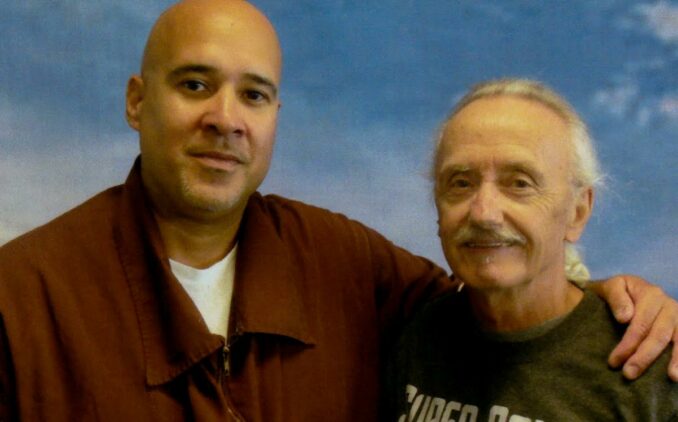Pennsylvania incarceree files grievance to reverse illegal punishment

Bryant Arroyo and Joe Piette at SCI Frackville in 2018.
An article about the struggle for the rights of people with disabilities within the Pennsylvania Department of Corrections system should never have led to punishment for two incarcerated people at the State Correctional Institution at Coal Township. But officials there retaliated for the article by taking its authors, William Rinnick, who is disabled, and jailhouse lawyer, Bryant Arroyo, out of general population and placing them in Administrative Custody (AC).
The article, “Fighting for disability rights behind bars” (Workers World, Jan. 15, 2024), exposed disability rights violations. Following its publication, Arroyo was placed in the Restricted Housing Unit. Because the RHU doesn’t comply with Americans with Disabilities Act regulations, Rinnick was placed in the infirmary.
Under AC status, any rights to “radio, tablet/kiosk access, television, or telephone calls” (except emergency or legal telephone calls) are denied. The loss of tablet use means that the incarcerated person cannot communicate with anyone by email. Calls or video meetings with friends or loved ones are severely limited. It amounts to isolation. (tinyurl.com/29red648)
Although judges dismissed all three separate charges against Arroyo, he was still punished. Prison officials transferred him to the State Correctional Institute at Pine Grove in western Pennsylvania, hundreds of miles away from his family.
Locked up, shackled, in handcuffs
When Arroyo is allowed to have a Zoom call, he’s locked in a room where the equipment for the virtual call is set up, but he’s kept in handcuffs attached to a leather belt around his waist. He told Workers World, “I’m locked in a room. But I’m still shackled even though they have a wicket where they can take the shackles off. So it’s really kind of awkward that they have me here like this.
“A wicket is just a slit in the door that opens up and you put your hand in it,” Arroyo said. “They have the wicket where they can uncuff me in here, and they can recuff me when they take me back out. So it doesn’t really present a security risk. That’s how they do me when they take me out of my cell. They open up the wicket, they pull my hands out, they cuff me, and then they open up the door, and they put the belt around me. The same thing should apply here.”
Retaliation after winning grievances
Arroyo filed a grievance against his expedited transfer from SCI Coal Township to SCI Pine Grove. His grievance argues that the transfer was “the culmination of a series of retaliatory actions that have been taken against me as a result of my actions as a whistleblower at SCI Coal Township and SCI Frackville. Those retaliatory actions include misconduct charges filed against me for asking for the recording of a virtual visitation, [which was requested] to make available to the public issues related to the elimination of in-person visitation, and misconduct charges filed against me for the circulation of prisoners’ rights publications and the denial of disability accommodation requests.”
All of these misconduct charges have since been dismissed by hearing examiners. Arroyo argued DOC Administration Regulations (shorturl.at/bilOV), specifically DOC ADM 009, page 47, number three, states that you cannot be punished for participating in media relations. Furthermore, DOC ADM 804, C, Section N, prohibits retaliation. Even though the misconduct charges were dismissed, he was still punished with a transfer.
Arroyo’s grievance against his improper transfer argues: “All of my misconduct charges were based on my exercise of constitutionally protected First Amendment rights. The transfer to SCI Pine Grove was a retaliatory action in itself, in that it was a transfer from a medium security institution to a maximum-security institution and that it was ordered 48 hours after a third misconduct.
“FO-24172 was filed by the same author who manufactured the first two charges, FO-24154 and FO-24162, on exactly the same grounds after the first two were dismissed without prejudice,” the grievance continues. “And the third charge was dismissed with prejudice. The transfer was intended to unequivocally punish and retaliate against me for my constitutionally protected exercise of free speech rights.”
Reimburse all legal expenses!
Arroyo’s grievance seeks the reimbursement of all fees and postage for his legal filings and for shipping up to five boxes of his papers to SCI Pine Grove and finally to “expedite my transfer back to an institution within the Eastern Region, specifically SCI Phoenix” in Montgomery County.
“Otherwise,” the grievance continued, “I will seek that remedy within the context of my federal lawsuit and seek damages against those that participated in my retaliatory expedited transfer to SCI Pine Grove. I will also include damages for the emotional injuries every waking day and night caused by the separation from my family members and inability to communicate with my family that this transfer has caused me.”
The law library in the RHU at SCI Pine Grove does not have a photocopier. This is an obstacle to filing legal challenges, Arroyo charges, especially for people who would want to contest why they’re being punished in the RHU.
“If someone wants to file a petition to the court, a brief or motion, or write to their lawyer for their legal case, instead of a computer, they are forced to use pen on paper. That alone should be fought, because they’re totally impeding access to their legal rights. and can you imagine elderly and infirm or somebody with arthritis writing with a pen that’s very thin? You could never finish it.”
Arroyo needs funds to continue his lawsuit against the Department of Corrections’ unconstitutional actions. Readers can contribute through JPay.com, entering Bryant Arroyo (CU-1126) when asked.

